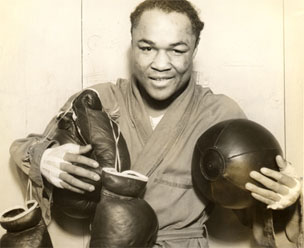Born in Columbus, Mississippi, on December 12, 1912, boxer Henry Armstrong became the featherweight, welterweight, and lightweight world champion in 1938. He was the first boxer to hold three different titles simultaneously. After he retired, Armstrong overcame alcoholism. He also became a Baptist minister and worked with at-risk youth. He was 75 when he died in Los Angeles on October 22, 1988.
When he was 4, Armstrong and his large family—he was the 11th of 15 children—moved to St. Louis. There, his grandmother took care of him after his mother passed away. After graduating from high school, Armstrong was employed to lay railroad tracks. While on the job one day, he saw an article about a boxer who had earned $75,000 for a fight. Inspired, he decided to pursue boxing himself.
In 1931, Armstrong fought as a professional in Pennsylvania, using the name Melody Jackson. He then headed to Los Angeles, where he became Henry Armstrong—he chose the last name of a close friend—and stood as an amateur once more. When he didn’t make the 1932 Olympic team, Armstrong again turned pro. After witnessing Armstrong’s ability to overwhelm opponents with an unceasing assault of punches, Al Jolson became one of the owners of the fighter’s contract. With new manager Eddie Mead, a plan was concocted for Armstrong to take the boxing world by storm by winning multiple titles.
In 1937, Armstrong became the featherweight champion after knocking out Petey Sarron. The next year, he moved up two weight classes and, in May, took the welterweight title from Barney Ross. A few months later, he shifted down into the lightweight category. His August 1938 win against Lou Ambers gave Armstrong the lightweight crown and made him the first boxer to hold three different weight division titles at the same time. At the end of 1938, Armstrong chose not to defend the featherweight title. He lost the lightweight title in 1939. Armstrong tried to become the middleweight champion in March of 1940, but the match ended in a draw. Many observers believed that he had been robbed by the decision. Armstrong successfully defended his welterweight crown multiple times, but on October 4, 1940, a defeat by Fritzie Zivic saw him lose that title as well. Although he had more wins in his career, including one against Zivic in 1942, Armstrong would never again hold a championship title.
In 1945, Armstrong retired from boxing. Though he had won at least half a million dollars during his career, he had very little money left when he retired. He soon compounded his problems by drinking heavily. Armstrong became a Baptist minister in 1951. He stopped drinking and started to work with at-risk youth in Los Angeles. After moving back to St. Louis, he took a job at the Herbert Hoover Boys Club.
As he grew older, Armstrong’s health began to decline, perhaps due in part to the brutal poundings he had endured in the ring. Dependent on Social Security to make ends meet, he also had to deal with failing vision and dementia in his last years. He died on October 22, 1988, in Los Angeles, at the age of 75. Armstrong was inducted into the International Boxing Hall of Fame in 1990. That organization lists him as having attained 151 wins, 21 losses and nine draws in 181 fights. In addition to this impressive record, Armstrong remains a boxing legend for his concurrent world titles in three separate divisions.

